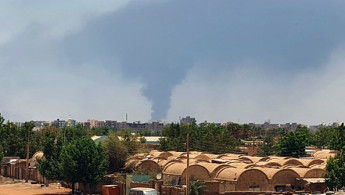Pressure by 'all possible means' needed to halt Sudan fighting, UN High Commissioner says
The UN rights chief on Thursday called on the international community to exert all possible pressure on the fighting sides in Sudan to resolve the conflict and end "the wanton violence".
The fighting has plunged "this much-suffering country into catastrophe", United Nations High Commissioner for Human Rights Volker Turk said.
Addressing a special session of the UN Human Rights Council on the situation in Sudan, he urged "all states with influence in the region to encourage, by all possible means, the resolution of this crisis".
His comments, via video message, came as fighting continued in the Sudanese capital, pushing ever more people to undertake dangerous journeys to safety across the country's borders.
More than 750 people have been killed and hundreds of thousands have been displaced in the fighting that began on April 15 between army chief Abdel Fattah al-Burhan and his former deputy Mohamed Hamdan Daglo, who commands the paramilitary Rapid Support Forces (RSF).
"I condemn the use of violence by individuals who have no regard for the lives and fundamental rights of millions of their own compatriots," Turk said, slamming "this wanton violence, in which both sides have trampled international humanitarian law".
Thursday's urgent council session in Geneva, requested by Britain, Germany, Norway and the United States, with the support of dozens of other countries, was expected to wrap up later with a vote on a draft text calling for an immediate halt to the violence.
Sudan's ambassador Hassan Hamid Hassan told the council his country was opposed to the special session, insisting that "what is happening in Sudan is an internal affair", and cautioning the session could distract from efforts to achieve a lasting ceasefire.
German ambassador Katharina Stasch flatly rejected that idea, insisting to the council that "peace and the respect for human rights go hand in hand".
US ambassador Michele Taylor also stressed "the negotiations to establish ceasefire and get desperately needed humanitarian assistance flowing to the people of Sudan can and must occur at the same time that our council fulfils its role and mandate in addressing the dire human rights situation".
"This is the moment to send a clear message to the parties of the conflict that the world is watching".
"There must be accountability for the horrific events taking place," agreed British foreign Office minister Andrew Mitchell, speaking via video message.
But without Sudan's blessing, other African countries and the Arab countries suggested they would not back Thursday's resolution, and a number of other countries spoke up to oppose it.
"The international community should respect Sudan's sovereignty and ownership of internal affairs," China's ambassador Chen Xu told the council.
Sources close to the negotiations said it was still expected that the resolution would pass in the 47-member council, but acknowledged it could be close.
The draft text being discussed condemns "all reported violations and abuses of human rights and violations of international humanitarian law, including reported acts of sexual and gender-based violence, committed since the start of hostilities by all parties to the conflict across the country".
In particular, the text calls for strengthening the mandate of an existing special rapporteur on the rights situation in Sudan to broaden monitoring of abuses, including in connection with the fighting.





 Follow the Middle East's top stories in English at The New Arab on Google News
Follow the Middle East's top stories in English at The New Arab on Google News
![The UAE is widely suspected of arming the RSF militia [Getty]](/sites/default/files/styles/image_330x185/public/2024-11/GettyImages-472529908.jpg?h=69f2b9d0&itok=Yauw3YTG)
![Netanyahu furiously denounced the ICC [Getty]](/sites/default/files/styles/image_330x185/public/2024-11/GettyImages-2169352575.jpg?h=199d8c1f&itok=-vRiruf5)
![Both Hamas and the Palestinian Authority welcomed the ICC arrest warrants [Getty]](/sites/default/files/styles/image_330x185/public/2024-11/GettyImages-2178351173.jpg?h=199d8c1f&itok=TV858iVg)